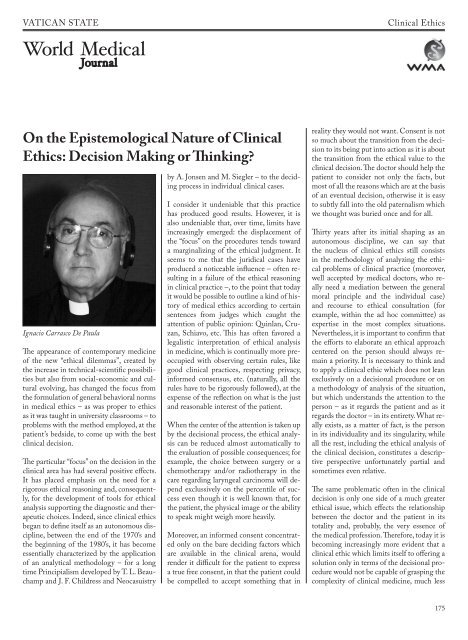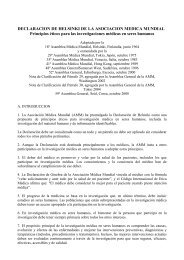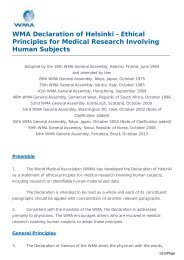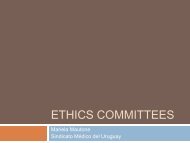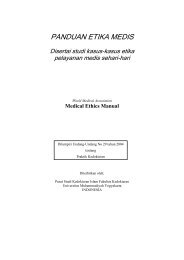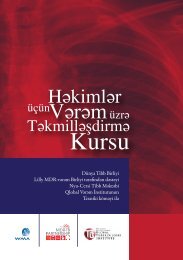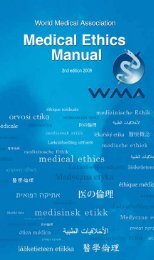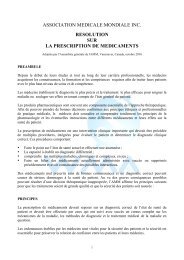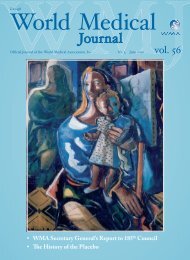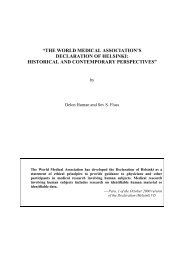WMJ 05 2011 - World Medical Association
WMJ 05 2011 - World Medical Association
WMJ 05 2011 - World Medical Association
Create successful ePaper yourself
Turn your PDF publications into a flip-book with our unique Google optimized e-Paper software.
VATICAN STATE<br />
Clinical Ethics<br />
On the Epistemological Nature of Clinical<br />
Ethics: Decision Making or Thinking<br />
Ignacio Carrasco De Paula<br />
The appearance of contemporary medicine<br />
of the new “ethical dilemmas”, created by<br />
the increase in technical-scientific possibilities<br />
but also from social-economic and cultural<br />
evolving, has changed the focus from<br />
the formulation of general behavioral norms<br />
in medical ethics – as was proper to ethics<br />
as it was taught in university classrooms – to<br />
problems with the method employed, at the<br />
patient’s bedside, to come up with the best<br />
clinical decision.<br />
The particular “focus” on the decision in the<br />
clinical area has had several positive effects.<br />
It has placed emphasis on the need for a<br />
rigorous ethical reasoning and, consequently,<br />
for the development of tools for ethical<br />
analysis supporting the diagnostic and therapeutic<br />
choices. Indeed, since clinical ethics<br />
began to define itself as an autonomous discipline,<br />
between the end of the 1970’s and<br />
the beginning of the 1980’s, it has become<br />
essentially characterized by the application<br />
of an analytical methodology – for a long<br />
time Principialism developed by T. L. Beauchamp<br />
and J. F. Childress and Neocasuistry<br />
by A. Jonsen and M. Siegler – to the deciding<br />
process in individual clinical cases.<br />
I consider it undeniable that this practice<br />
has produced good results. However, it is<br />
also undeniable that, over time, limits have<br />
increasingly emerged: the displacement of<br />
the “focus” on the procedures tends toward<br />
a marginalizing of the ethical judgment. It<br />
seems to me that the juridical cases have<br />
produced a noticeable influence – often resulting<br />
in a failure of the ethical reasoning<br />
in clinical practice –, to the point that today<br />
it would be possible to outline a kind of history<br />
of medical ethics according to certain<br />
sentences from judges which caught the<br />
attention of public opinion: Quinlan, Cruzan,<br />
Schiavo, etc. This has often favored a<br />
legalistic interpretation of ethical analysis<br />
in medicine, which is continually more preoccupied<br />
with observing certain rules, like<br />
good clinical practices, respecting privacy,<br />
informed consensus, etc. (naturally, all the<br />
rules have to be rigorously followed), at the<br />
expense of the reflection on what is the just<br />
and reasonable interest of the patient.<br />
When the center of the attention is taken up<br />
by the decisional process, the ethical analysis<br />
can be reduced almost automatically to<br />
the evaluation of possible consequences; for<br />
example, the choice between surgery or a<br />
chemotherapy and/or radiotherapy in the<br />
care regarding laryngeal carcinoma will depend<br />
exclussively on the percentile of success<br />
even though it is well known that, for<br />
the patient, the physical image or the ability<br />
to speak might weigh more heavily.<br />
Moreover, an informed consent concentrated<br />
only on the bare deciding factors which<br />
are available in the clinical arena, would<br />
render it difficult for the patient to express<br />
a true free consent, in that the patient could<br />
be compelled to accept something that in<br />
reality they would not want. Consent is not<br />
so much about the transition from the decision<br />
to its being put into action as it is about<br />
the transition from the ethical value to the<br />
clinical decision. The doctor should help the<br />
patient to consider not only the facts, but<br />
most of all the reasons which are at the basis<br />
of an eventual decision, otherwise it is easy<br />
to subtly fall into the old paternalism which<br />
we thought was buried once and for all.<br />
Thirty years after its initial shaping as an<br />
autonomous discipline, we can say that<br />
the nucleus of clinical ethics still consists<br />
in the methodology of analyzing the ethical<br />
problems of clinical practice (moreover,<br />
well accepted by medical doctors, who really<br />
need a mediation between the general<br />
moral principle and the individual case)<br />
and recourse to ethical consultation (for<br />
example, within the ad hoc committee) as<br />
expertise in the most complex situations.<br />
Nevertheless, it is important to confirm that<br />
the efforts to elaborate an ethical approach<br />
centered on the person should always remain<br />
a priority. It is necessary to think and<br />
to apply a clinical ethic which does not lean<br />
exclusively on a decisional procedure or on<br />
a methodology of analysis of the situation,<br />
but which understands the attention to the<br />
person – as it regards the patient and as it<br />
regards the doctor – in its entirety. What really<br />
exists, as a matter of fact, is the person<br />
in its individuality and its singularity, while<br />
all the rest, including the ethical analysis of<br />
the clinical decision, constitutes a descriptive<br />
perspective unfortunately partial and<br />
sometimes even relative.<br />
The same problematic often in the clinical<br />
decision is only one side of a much greater<br />
ethical issue, which effects the relationship<br />
between the doctor and the patient in its<br />
totality and, probably, the very essence of<br />
the medical profession. Therefore, today it is<br />
becoming increasingly more evident that a<br />
clinical ethic which limits itself to offering a<br />
solution only in terms of the decisional procedure<br />
would not be capable of grasping the<br />
complexity of clinical medicine, much less<br />
175


